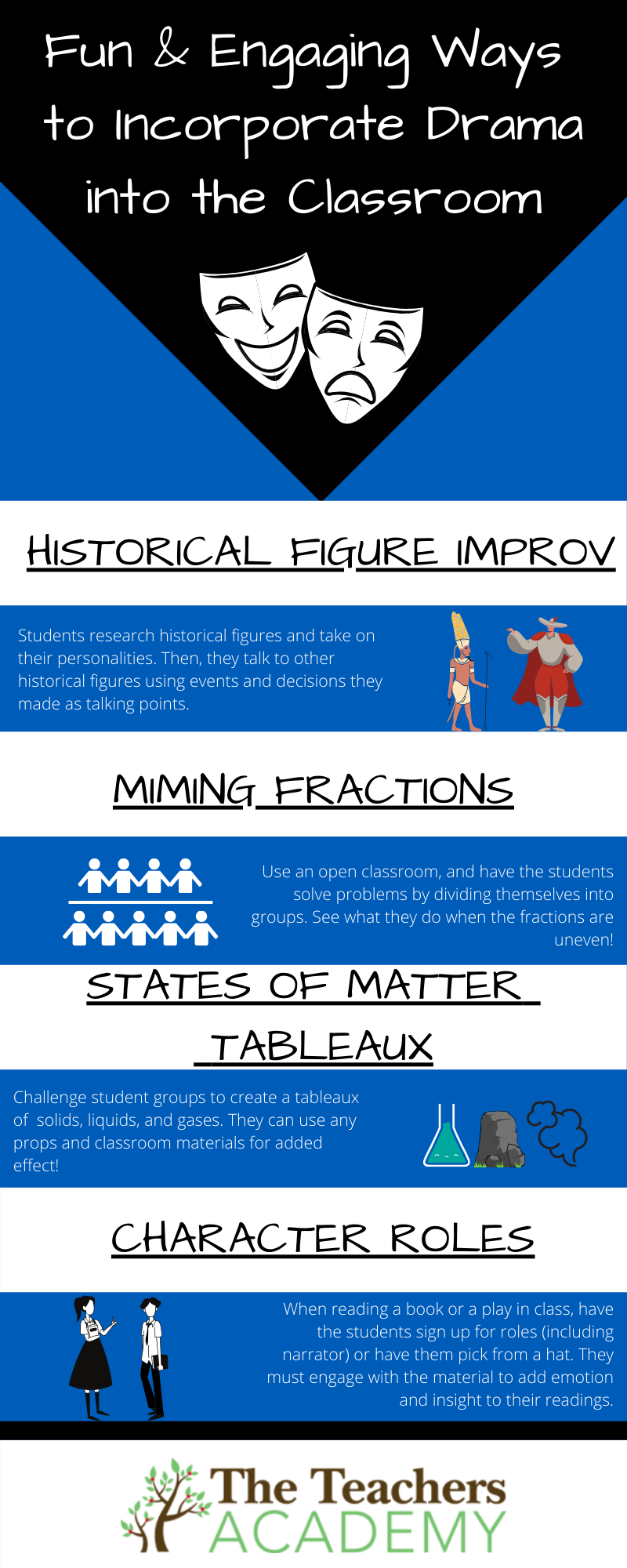Blog
Reasons Why Teaching Theater & Drama is Rewarding for Students
- March 23, 2020
- Posted by: The Teachers Academy
- Category: All Blog Postings Online Courses

Drama mimics life in many ways, which is why, since the time of Aristotle, drama and theater have had very special places in education. It offers students the ability to “do” rather than memorize and to have fun while learning valuable lessons about life, morals, emotions, and each other in a safe and freeing atmosphere. Whether you are an English teacher or a science teacher, incorporating drama into your curriculum can be rewarding for not just you, but for your students as well!
At The Teachers Academy, we provide excellent online professional development for teachers and recognize the benefits of incorporating drama and theater into the classroom. However, we also know that it can be a daunting task for many educators, especially if they teach in content areas that have not been historically associated with the dramatic arts. This problem has inspired us to design the online professional development course, “Teaching Drama Across the Curriculum.” Whether you are skeptical about or interested in the prospect of drama integration, we ask that you consider enrolling in the course, and continue reading to learn about some of the advantages of teaching drama in the classroom.
Benefitting Learning Through The Dramatic Arts
There are many reasons why educators should give theater a chance in their classrooms, and some of the best reasons are listed below:
- Drama is Relatable
As we mentioned above, drama mimics real life, so integrating dramatic elements into education makes learning more relatable. Students are trying to deal with many difficulties in life, and the characters they play are most likely going through similar things. For example, the story of “Hamlet” deals with indecision and fear when the pressure is on, and Walter Lee Younger and his family from “A Raisin in the Sun” struggle with prejudice and the dreams of a better life.
- Drama Enhances Social, Creative Problem Solving and Communication Skills
Everything about theater is social. From dialogue to nonverbal cues and emotional expression, drama helps improve social skills and communication techniques and calls on students to think for themselves.
- Drama is Fun, Entertaining and Engaging
When students get up and interact with their classmates, they are more likely to become engaged in the content. Learning can be fun, and integrating drama into the curriculum is a great way to make learning more interactive, regardless of content area.
- Drama Helps Students Consider Other Perspectives and Values
Walking in someone else’s shoes is a requirement of drama. Whether a student is posing as King Henry V in tableau or playing Stella from “A Streetcar Named Desire,” he or she will have access to the perspectives and circumstances of another person. Drama provides endless opportunities to consider moral values and explore gray areas, as well.
Bringing Drama Into the General Ed Classroom

Drama can be an asset to your classroom if you use it to enhance your lessons and engage your students. For more guidance on how to best incorporate theater into your curriculum, our “Teaching Drama Across the Curriculum” Course can provide you with other activity suggestions and valuable advice.
If you are intrigued by bringing theater into your classroom, feel free to enroll in our course today! We also offer a versatile collection of courses that count for Act 48 credits for PA teachers, so feel free to peruse our selections and enroll in one you think could benefit you and your students!
